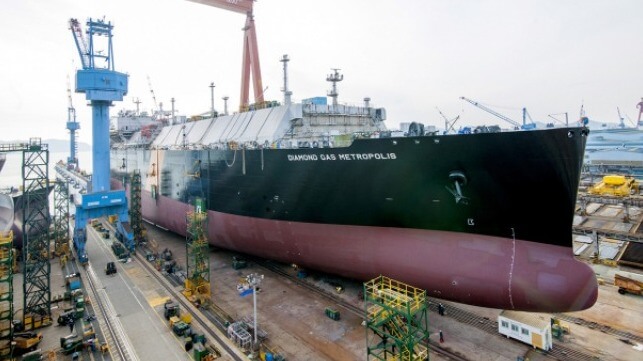LNG Carrier Shipbuilding Risks Stranded Assets Due to Climate Policies

The rapid growth in LNG shipbuilding responding to the demand for gas transport is raising the likelihood of creating stranded assets writes Climate Analytics, a climate science and policy institute, in a newly released report entitled “High and Dry: The global energy transition's looming impact on the LNG and oil shipbuilding industry.” Partnering with South Korean climate and energy advocacy group Solutions for Our Climate, the report highlights the risk of overshooting LNG shipping capacity which is increased by future energy scenarios that call for the rapid elimination of fossil fuels.
“This report finds that the uptake in shipping capacity far exceeds global forecasts for the LNG trade as the world transitions away from fossil fuels,” writes Victor Maxwell and Nandini Das as co-authors of the report. The report calls for Korea and other shipbuilding countries to redirect public finance currently subsidizing fossil fuels, including shipbuilding activities, toward clean energy. Doing so they write would avoid stranded asset risk and delivery a transition for the shipbuilding industry away from its focus on gas carriers and crude oil tankers.
The orderbook for LNG carriers grew to record levels in 2022, with the authors citing the oil and gas industry’s “dash for LNG following Russia’s invasion of Ukraine.” While the war and the embargoes on Russian energy shifted demand to make up for the lost supplies, producing nations have also been rushing to increase capacity and LNG exports. Producers are expanding their facilities in the United States as nations such as China rapidly increase imports while Qatar is in the final phase of a long-term expansion project to open its new North Field which is expected to double the country’s exports.
The report analyzes the outlook for LNG carrier and oil tanker shipbuilding using a variety of scenarios in the efforts to slow global warming. They point out that these ship types in the five years between 2016 and 2020 accounted for 27 percent and 10 percent of shipbuilding globally.
They calculate that at the end of 2021, there were around 700 LNG ships. However, they highlight the rapid growth in 2022 saying that 34 LNG carriers were added last year and a further 335 LNG carriers are expected to deliver between 2023 and 2028, according to data from Clarkson Research.
They further highlight that the South Korean shipbuilding industry is heavily dependent on LNG carriers. Along with tankers they said these ships rank among South Korea’s top ten exports in terms of value. In 2022, Korean shipbuilders won over 70 percent of the orders for LNG carriers, representing 65 percent of the tonnage order from the country’s shipbuilders. The market for VLCCs has been slower based on the downturn in the oil markets but rebounded since mid-2022 as analysts predicted the beginning of a prolonged upcycle in the oil market.
The report highlights that shipowners are also continuing to explore further LNG carrier orders. They cite reports that QatarEnergy is in discussions with the South Korean shipbuilders for a further order of up to 40 LNG carriers for delivery by 2027. TotalEnergies is also reported in discussion for an order of 17 LNG carriers to support its resumption of the Mozambique LNG project.

that matters most
Get the latest maritime news delivered to your inbox daily.
“If built, the global LNG shipping capacity will further exceed IEA’s forecast of LNG trade,” the report warns. “This poses a particular risk for financial institutions that provide loans and underwriting to the capital-intensive shipbuilding industry.”
They conclude that any decline in the market for these ships will have a significant impact on the sector and broader implications for shipbuilding nations. Given the traditional economic lifespan for ships versus the timelines for cutting and eliminating fossil fuel use, the report highlights the potential for creating stranded assets among the current class of newbuilds. They call for shipbuilders and their nations to prepare for these changes highlighting the heavy dependence on oil tanker and gas carrier construction creates a likelihood for a fundamental crisis.
